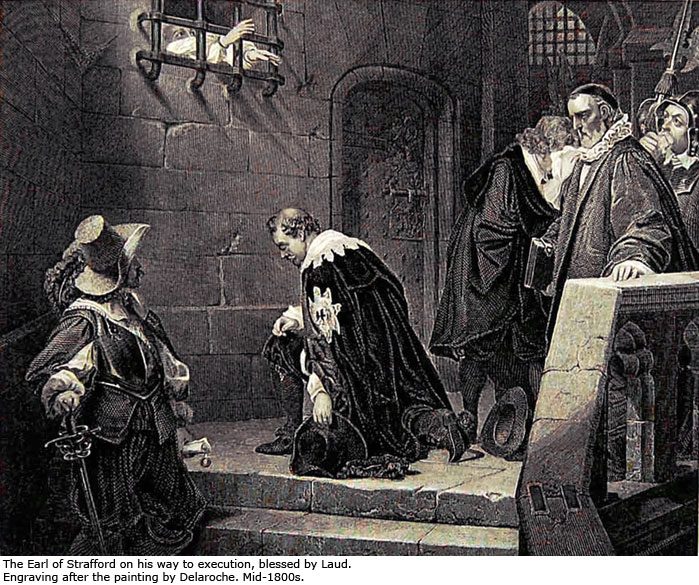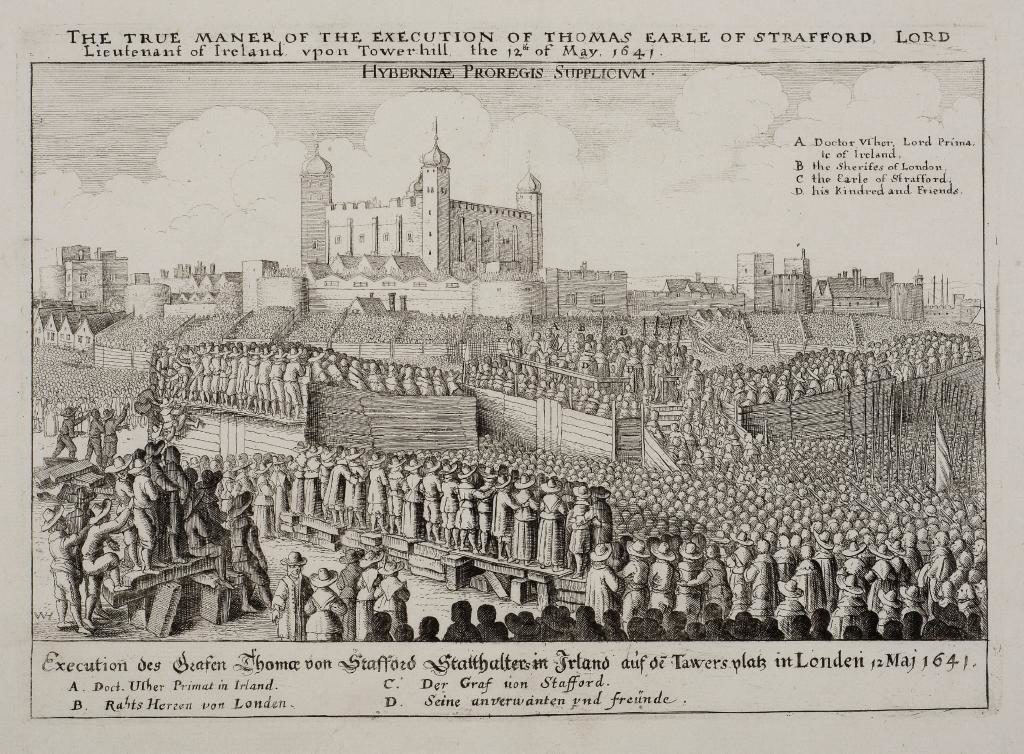On May 12, 1641, Thomas Wentworth, the Earl of Strafford was executed. It was a pivotal moment in the relationship between King Charles and the Parliament he would be at war with just a few months later.
Strafford also gave a speech to the Lords earlier in the day.
This, however, is the speech he gave while standing on the scaffold, as an estimated 1-200,000 people watched. I’ve edited these slightly, just to make them a little more readable, but you can find the original speech here.

The scene of the execution
As Strafford was leaving the Tower for the last time, the Lieutenant of the Tower suggested to take his coach to the Scaffold, to prevent the mob from tearing him to pieces on the way to his execution. Strafford refused, saying it didn’t make a difference to him whether he died by the hand of the executioner or by the fury of the people.
He passed Laud’s cell on his way out of the Tower but Laud wasn’t at his window – he said he might not be able to be. Laud did appear, though, and when he did, Strafford bowed and said, “My Lord, your prayers and your blessing.” Laud obliged, and when he was done Strafford said, “Farewell, my Lord, God protect your innocence.” Laud fainted.
As Strafford walked to the scaffold, the crowds were silent, and he raised his hat to the spectators who lined his path. Friends and family accompanied him, and he said his goodbyes. When his brother started crying, Strafford interrupted the other goodbyes to speak to him.
“Brother, what do you see in me to deserve these tears? Doth any indecent fear betray in me a guilt, or my innocent boldness any atheism? Never did I throw off my clothes with greater freedom and content than in this preparation to my grave. That stock must be my pillow; there shall I rest from all my labors. No thought of envy, no dreams of treason, jealousies or cares for the King, the State or myself shall interrupt this easy sleep. Therefore brother, with me pity those who, beside their intention, have made me happy. Rejoice in my innocence.”
Then, he spoke to the crowd.
Strafford’s last speech
My Lord Primate of Ireland (and my Lords, and the rest of these gentlemen) it is a very great comfort to me to have your Lordship by me this day, in regard I have been known to you a long time. I should be very glad to obtain so much silence, as to be heard a few words, but I doubt I shall not.
My Lord, I come hither by the good will and pleasure of Almighty God, and to pay the last debt I owe to sin, which is death, and by the blessing of that God to rise again through the merits of Christ Jesus to eternal glory. I wish I had been private, that I might have been heard. My Lord, if I might be so much beholden to you, that I might use a few words, I should take it for a very great courtesy.
My Lord, I come hither to submit to that judgment which hath passed against me. I do it all with a very quiet and contented mind. I do freely forgive all the world, a forgiveness that is not spoken from teeth outward (as they say) but from the heart. I speak it in the presence of Almighty God, before whom I stand, that there is not so much as a displeasing thought in me arising to any creature.
I thank God I may say truly, and my conscience bears me witness, that in all my services since I have had the honor to serve his majesty in any employment, I have never had any thing in my heart, but the joint and individual prosperity of king and people. If it have been my hap to be misconstrued, it is the common portion of us all while we are in this life. The righteous judgment is hereafter. Here, we are subject to error, and apt to be misjudged one of another.
There is one thing I desire to clear myself of, and I am very confident I speak it with so much clearness, that I hope I shall have your Christian charity in the belief of it. I did always and ever think the Parliaments of England were the happiest Constitutions that any kingdom or any nation lived under, and under God the means of making king and people happy. So, far have I been from being against Parliaments.
For my death here I acquit all the world, and pray God heartily to forgive them, and in particular my Lord Primate. I am very glad that his Majesty is pleased to conceive me not meriting so severe and heavy a punishment as the utmost execution of this sentence. I am very glad and infinitely rejoice in this mercy of his, and beseech God to turn it to him, that he may find mercy when he hath most need of it.
I wish this kingdom all the prosperity and happiness in the world. I did it living, and now dying it is my wish. I do now profess it from my heart, and do most humbly recommend it unto every man here, and with every man, to lay his hand upon his heart and consider seriously whether the beginning of the happiness of a people should be written in letters of blood. I fear you are in a wrong way, and I desire almighty God that not one drop of my blood may rise up in judgment against you.
My Lord, I profess myself a true and obedient Son to the Church of England, to that Church wherein I was born, and wherein I was bred, prosperity and happiness be ever to it. And whereas it hath been said that I have inclined to Popery, if it be an objection worth answering, let me say truly that from time since I was one and twenty years of age, till this hour, now going upon 49, I never had thought in my heart to doubt the truth of my religion in England, and never any had the boldness to suggest to me the contrary, to the best of my remembrance. And so being reconciled to the mercies of Christ Jesus, my Savior, into whose bosom I hope shortly to be gathered to those eternal happinesses that shall never have end.
I desire heartily the forgiveness of every man, both for any rash or unadvised word or deed, and desire your prayers. And so my lords, farewell. Farewell all the things of this world. Lord, strengthen my faith, give me confidence and assurance in the merits of Christ Jesus. I desire you that you would be silent and join in prayers with me, and I trust in God that we shall all meet and live eternally in Heaven, there to receive the accomplishment of all happiness, where every tear shall be wiped from our eyes, and every sad thought from our hearts. And so God bless this Kingdom, and Jesus have mercy upon my soul.
After individually saluting the noblemen and saying goodbye to the people who had accompanied him to the scaffold, Strafford asked those with him to pray with him and for him. Then, his Chaplain laid the book of common prayer upon the chair before him as he kneeled and prayed from the book for 15 minutes, and then for another 15 minutes without a book, and ended with the Lord’s Prayer. He asked his brother to remember him to his wife and sister, and to tell his children to fear God and his oldest son to be an obedient son of the Church of England and faithful subject to the King, not to bear any grudge regarding his fate, and to content himself to be a servant to his country as a justice of the peace – not ambitiously aiming at higher office. Finally, he concluded …
Now I have nigh done. One stroke will make my wife husbandless, my dear children fatherless, and my poor servants masterless, and separate me from my dear brother and all my friends, but let God be to you and them, all in all.
I thank God I am no more afraid of death, nor daunted with any discouragements rising from any fears, but do as cheerfully put off my dublet at this time, as ever I did when I went to bed.
With the white cap on, he called the executioner. The executioner asked for his forgiveness, and he replied that he forgave him and all the world. He knelt, prayed a little more, accompanied only by a bishop and minister. He laid down, and signaled for the executioner to strike.
